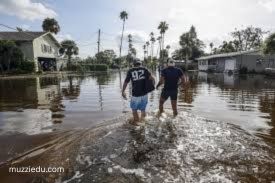Hurricane Milton picked up significant speed on Monday, and before it makes landfall in Florida in the next few days, the Yucatan Peninsula in Mexico is expected to experience extremely high winds and storm surges.
Some Floridians have been told to leave for the second time in a few weeks due to Hurricane Helene, which was nearly fatal. The most recent hurricane to hit the Gulf of Mexico is named after her.
Milton was classified as “an extremely dangerous Category 4 hurricane” by the US National Hurricane Center (NHC) on a five-point rating system, with maximum sustained winds of 240 km per hour.
Governor Ron DeSantis of Florida stated that there was a race to clean Hurricane Helene’s damage before Milton arrives in the middle of the week. DeSantis has issued a state of emergency in 51 of his state’s 67 counties.
DeSantis stated during a press conference, “We need as much of this debris picked up as possible.” “This increases the risk to public safety and increases the potential damage that flying debris could cause to Milton.”
The NHC issued a warning for massive, catastrophic waves on the shore and storm surges that could raise water levels by 1.5 meters along the Yucatan Peninsula. It is predicted that 250 millimeters of rainfall and storm surges will devastate Florida, resulting in flash flooding in urban areas.
After Hurricane Helene struck many states in the US Southeast, killing at least 230 people, emergency personnel are still having difficulty delivering relief.
Political stakes
A flurry of politically motivated false accusations has derailed efforts following Helene in the run-up to the presidential election on November 5.
Among the litany of falsehoods is the claim propagated by Republican candidate Donald Trump that monies have been plundered by his challenger for the White House, Democrat Kamala Harris, and routed toward migrants.
Federal Emergency Management Agency (FEMA) Administrator Deanne Criswell denied the allegations as untrue.
“While we have the risk of wind, the water is what’s killing people, so please listen to your local officials and seek safety,” she issued a warning on Monday. “These storms are bringing more water than they ever have,” she said.
Because there is more energy in warmer waters for storms to feed on, scientists believe that climate change is probably a factor in the hurricanes’ fast intensification.
After receiving a briefing on Milton, President Joe Biden said in a statement that his administration was preparing “life-saving resources.”
On September 26, Hurricane Helene made landfall as a Category 4 hurricane off the coast of Florida. She dumped an incredible amount of rain, and later on, isolated inland towns in states farther north, such as North Carolina and Tennessee, saw severe flooding.
With the death toll still growing, the storm was the deadliest natural catastrophe to strike the continental United States since Hurricane Katrina in 2005. Many communities—especially those in hilly regions—no longer have access to clean drinking water or electricity.
DeSantis reported that power has been restored to Florida since last week, but numerous electrical teams were sent to neighboring states severely affected by Hurricane Helene.
He stated, “There are crews working there, but they’re bringing people in from far and wide to be able to respond, because there are still hundreds of thousands of people without power in some of these other states that got hit by Helene.”
“Remain a hurricane at some level all the way through leaving the east coast of Florida,” he warned Milton.

